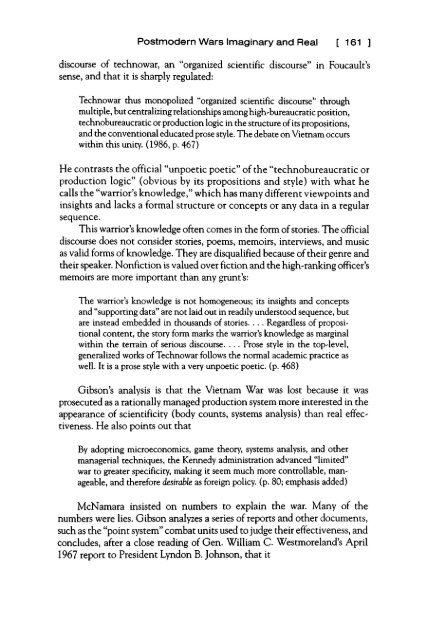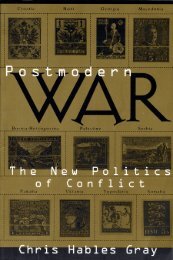Postmodern Wars Imaginary and Real: World War III - Chris Hables ...
Postmodern Wars Imaginary and Real: World War III - Chris Hables ...
Postmodern Wars Imaginary and Real: World War III - Chris Hables ...
Create successful ePaper yourself
Turn your PDF publications into a flip-book with our unique Google optimized e-Paper software.
<strong>Postmodern</strong> <strong><strong>War</strong>s</strong> <strong>Imaginary</strong> <strong>and</strong> <strong>Real</strong> [ 161 ]<br />
discourse of technowar, an "organized scientific discourse" in Foucault's<br />
sense, <strong>and</strong> that it is sharply regulated:<br />
Technowar thus monopolized "organized scientific discourse'' through<br />
multiple, but centralizing relationships among high-bureaucratic position,<br />
technobureaucratic or production logic in the structure of its propositions,<br />
<strong>and</strong> the conventional educated prose style. The debate on Vietnam occurs<br />
within this unity. (1986, p. 467)<br />
He contrasts the official "unpoetic poetic" of the "technobureaucratic or<br />
production logic" (obvious by its propositions <strong>and</strong> style) with what he<br />
calls the "warrior's knowledge," which has many different viewpoints <strong>and</strong><br />
insights <strong>and</strong> lacks a formal structure or concepts or any data in a regular<br />
sequence.<br />
This warrior's knowledge often comes in the form of stories. The official<br />
discourse does not consider stories, poems, memoirs, interviews, <strong>and</strong> music<br />
as valid forms of knowledge. They are disqualified because of their genre <strong>and</strong><br />
their speaker. Nonfiction is valued over fiction <strong>and</strong> the high-ranking officer's<br />
memoirs are more important than any grunt's:<br />
The warrior's knowledge is not homogeneous; its insights <strong>and</strong> concepts<br />
<strong>and</strong> "supporting data" are not laid out in readily understood sequence, but<br />
are instead embedded in thous<strong>and</strong>s of stories. ... Regardless of propositional<br />
content, the story form marks the warrior's knowledge as marginal<br />
within the terrain of serious discourse. . . . Prose style in the top-level,<br />
generalized works of Technowar follows the normal academic practice as<br />
well. It is a prose style with a very unpoetic poetic, (p. 468)<br />
Gibson's analysis is that the Vietnam <strong>War</strong> was lost because it was<br />
prosecuted as a rationally managed production system more interested in the<br />
appearance of scientificity (body counts, systems analysis) than real effectiveness.<br />
He also points out that<br />
By adopting microeconomics, game theory, systems analysis, <strong>and</strong> other<br />
managerial techniques, the Kennedy administration advanced "limited"<br />
war to greater specificity, making it seem much more controllable, manageable,<br />
<strong>and</strong> therefore desirable as foreign policy, (p. 80; emphasis added)<br />
McNamara insisted on numbers to explain the war. Many of the<br />
numbers were lies. Gibson analyzes a series of reports <strong>and</strong> other documents,<br />
such as the "point system" combat units used to judge their effectiveness, <strong>and</strong><br />
concludes, after a close reading of Gen. William C. Westmorel<strong>and</strong>'s April<br />
1967 report to President Lyndon B. Johnson, that it








